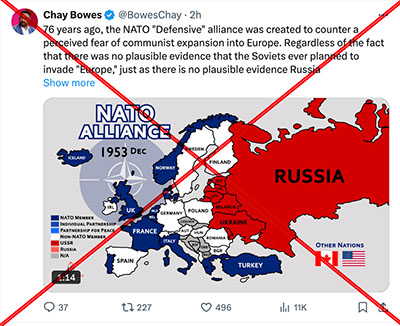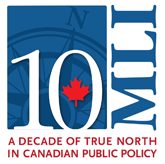
Chay Bowes is an Irish influencer who has been identified as a “self-proclaimed freedom fighter and journalist spreading kremlin disinformation. A recent tweet posted by Bowes, serves as an example of how online influencers amplify Kremlin-aligned narratives, weaving together revisionist history, emotional appeals, and conspiracy theories to delegitimize NATO and shift blame for the war in Ukraine onto Western elites.
The Claims:
Bowes constructs a narrative that challenges NATO’s legitimacy, portrays the alliance as a destructive force, and shifts blame for the Ukraine war onto Western elites.
He begins by asserting that NATO was founded on fabricated fears of Soviet expansion, claiming there was no credible evidence that the USSR intended to invade Europe—a claim he extends to modern Russia, which he depicts as similarly misunderstood and unfairly maligned.
Bowes further argues that NATO lost its purpose after the Soviet Union dissolved, yet continued “expanding” unnecessarily, despite Russian warnings. He frames this expansion as a self-serving agenda, driven by Western elites to impose their worldview on Europe.
NATO, in his view, has devolved into a “weapons sales scam,” prioritizing corporate profits and political influence over genuine defense.
In the context of Ukraine, he claims that NATO is desperately perpetuating conflict to avoid admitting failure, suggesting the war is orchestrated by elites in Washington and London to enrich themselves at the expense of ordinary citizens. Finally, he argues that Russia, with its historical memory of war’s devastation, has no desire for conflict with NATO, contrasting it with Western leaders who allegedly exploit their populations to fund and fight wars.
The Facts:
Bowes’ narrative misrepresents history and current events, distorting NATO’s purpose and actions while absolving Russia of responsibility. NATO was founded in 1949 not on unfounded fears, but in direct response to Soviet actions such as the Berlin Blockade, the coup in Czechoslovakia, and the forced Soviet occupation and colonization of independent Eastern European nations. These events provided ample evidence of Soviet expansionism, which NATO sought to counter through collective defense.
Post-Cold War, NATO’s enlargement was driven by the voluntary decisions and requests of Eastern European nations seeking security guarantees against a resurgent Russia. Bowes’ claim that NATO ignored Russian warnings overlooks the right of these nations to determine their own futures and security arrangements, and rejects their lived experiences of Soviet repression, which fueled their desire to join the alliance.
His portrayal of NATO as a “weapons sales scam” is equally misleading. While defense contractors do benefit from military spending, NATO’s primary mission remains collective security, not profiteering.
In the case of Ukraine, Bowes misrepresents NATO’s role. NATO has not deployed troops but has provided material support to Ukraine to resist Russia’s aggression, which began with the annexation of Crimea in 2014 and escalated with the 2022 invasion.
Bowes’ assertion that Russia has no interest in conflict with NATO contradicts its actions, including military threats against NATO members and unprovoked invasions of neighboring countries like Georgia and Ukraine. The Kremlin has also made claims to all of the resources under the Arctic Sea and warned of a coming Arctic conflict. His framing ignores clear evidence that Russia’s invasion is the root cause of the conflict.
Narrative Context:
Bowes’ tweet mirrors key Kremlin disinformation narratives designed to undermine Western unity, erode trust in NATO, and absolve Russia of accountability. By framing NATO as a provocative and illegitimate force and portraying Russia as a peaceful victim, this messaging appeals to anti-establishment audiences, on both extremes of the political spectrum in the West who are skeptical of military alliances, government elites, and defense spending.
The narrative employs several disinformation tactics. Historical revisionism recasts NATO’s origins and Soviet expansionism to delegitimize the alliance. Whataboutism deflects attention from Russia’s aggression by pointing to NATO’s controversial interventions. Emotional manipulation stirs anger by highlighting civilian suffering and economic hardship, while conspiracy theories suggest that Western elites and corporations orchestrate wars for profit.
This assists the achieving the Kremlin’s overarching goal, which is to weaken public support for NATO and Ukraine, fostering division and skepticism within Western societies. This aligns with the Kremlin’s broader strategy of exploiting fractures in Western alliances to diminish collective resolve against Russia’s actions. By amplifying distrust and redirecting blame, Bowes contributes to a disinformation ecosystem that undermines the international response to Russian aggression.

